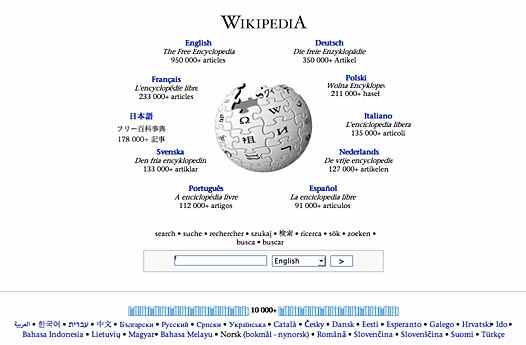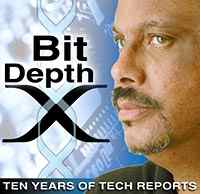BitDepth 510 - February 07
07/01/09 19:30 Filed in: BitDepth - February 2006
Wikipedia is one of the largest repositories of pure information ever assembled by you and me...
Home brewed reference

Like Google, the Wikipedia masks a depth of information with a spare website design that focuses on search.
There was this guy I'd get into arguments with a few years ago at the Guardian. Well, "arguments" is probably a strong word, but he'd hold to a position so rigorously that it became a kind of cruel fun to hold to a point because it was such a life and death proposition for him.
There was one discussion I remember particularly, and it was about distributing CD-ROM based encyclopedia references.
"Why," he asked, "when they can just look everything up on the Net?"
Horrified, I launched into a long screed about peer-reviewed information that's subject to high editorial standards and I might even have been right about the reliability of some Internet sources, but ultimately I was wrong.
The Internet has some intriguing ways of working its way around almost every glitch in its matrix.
I grew up with a yellowing copy of the Encyclopaedia Britannica, but my nephews and nieces are growing up with the Wikipedia, which changes every day, sometimes hourly.
Of course, the Britannica has gone online as well, but accessing its full depth of content will cost you US$85 per year, which isn't such a great deal considering that the 2006 DVD edition of the reference volume sells for US$45. So, online, at least, Britannica is a dud, offering slivers of its information as a temptation to potential subscribers.
Britannica and its rivals have built their reputations of definitive writing about the range of human knowledge by acknowledged experts in the field under discussion.
The Wikipedia is something entirely different. A "wiki" is a website that's designed to encourage participation by allowing anyone to add or edit content that is posted.
In reporting on the engine that drives it's own guts, the Wikipedia describes the system as "a simplification of the process of creating HTML web pages combined with a system that records each individual change that occurs over time, so that at any time, a page can be reverted to any of its previous states."
This means that every Wikipedia entry can be quickly updated or corrected, but it also opens all its pages to vandals. It also means that the largest wiki in the world is the Wikipedia itself.
I checked back in with the Trinidad and Tobago entry on Wikipedia and found a much lusher page than the one I looked at a year ago. Wikipedia entries that are being well-tended have two important characteristics, lots of links to additional information that makes the base entry more valuable and a rich revision history.
The most active editor on the T&T page currently is a Wikipedia administrator who goes by the handle "Guettarda" and describes himself as "a Trinidadian of Pathan, Indian and German origins, based in Oklahoma."
Much of his work over the past couple of months seems to have been blocking innocent errors (Noble for Mr Walcott's and Mr Naipaul's prizes) and deliberate vandalism. On his Wikipedia user page, he has a note highlighted in bold yellow that pleads "Is the project still viable when trolls and mischief-makers are able to drive out contributors, when stalkers and people carrying out private vendettas seem to be able to attack and harass editors at will?"
It's a problem that has begun to plague Wikipedia internationally as its reputation and use broadens.
When a German family objected to the use of their dead son's name in a report in Wikipedia on the late hacker, a German court legislated the German edition off the Internet for three full days before it became obvious that the information remained available through other editions beyond the reach of German law.
Late last year, John Seigenthaler, Sr, a journalist, publisher, and political figure, discovered that his Wikipedia entry implicated him in the assassination of Robert Kennedy. Pranks like this are swiftly corrected and rarely last longer than minutes on more carefully monitored pages, but the frontier spirit that drove the building of Wikipedia's impressive database of information is now attracting folks from the seedier side of town.
These aren't the problems that traditional encylopedia producers tend to face, but they are a logical consequence of information that's distilled from a cacophony of varied contributors and not sourced and verified from a single omniscient piece of expert writing.
The fever to contribute hasn't stopped with the encyclopedia. There are now subsites publishing open source books, a species taxonomy, a quote database and a dictionary in the world of Wiki.

Like Google, the Wikipedia masks a depth of information with a spare website design that focuses on search.
There was this guy I'd get into arguments with a few years ago at the Guardian. Well, "arguments" is probably a strong word, but he'd hold to a position so rigorously that it became a kind of cruel fun to hold to a point because it was such a life and death proposition for him.
There was one discussion I remember particularly, and it was about distributing CD-ROM based encyclopedia references.
"Why," he asked, "when they can just look everything up on the Net?"
Horrified, I launched into a long screed about peer-reviewed information that's subject to high editorial standards and I might even have been right about the reliability of some Internet sources, but ultimately I was wrong.
The Internet has some intriguing ways of working its way around almost every glitch in its matrix.
I grew up with a yellowing copy of the Encyclopaedia Britannica, but my nephews and nieces are growing up with the Wikipedia, which changes every day, sometimes hourly.
Of course, the Britannica has gone online as well, but accessing its full depth of content will cost you US$85 per year, which isn't such a great deal considering that the 2006 DVD edition of the reference volume sells for US$45. So, online, at least, Britannica is a dud, offering slivers of its information as a temptation to potential subscribers.
Britannica and its rivals have built their reputations of definitive writing about the range of human knowledge by acknowledged experts in the field under discussion.
The Wikipedia is something entirely different. A "wiki" is a website that's designed to encourage participation by allowing anyone to add or edit content that is posted.
In reporting on the engine that drives it's own guts, the Wikipedia describes the system as "a simplification of the process of creating HTML web pages combined with a system that records each individual change that occurs over time, so that at any time, a page can be reverted to any of its previous states."
This means that every Wikipedia entry can be quickly updated or corrected, but it also opens all its pages to vandals. It also means that the largest wiki in the world is the Wikipedia itself.
I checked back in with the Trinidad and Tobago entry on Wikipedia and found a much lusher page than the one I looked at a year ago. Wikipedia entries that are being well-tended have two important characteristics, lots of links to additional information that makes the base entry more valuable and a rich revision history.
The most active editor on the T&T page currently is a Wikipedia administrator who goes by the handle "Guettarda" and describes himself as "a Trinidadian of Pathan, Indian and German origins, based in Oklahoma."
Much of his work over the past couple of months seems to have been blocking innocent errors (Noble for Mr Walcott's and Mr Naipaul's prizes) and deliberate vandalism. On his Wikipedia user page, he has a note highlighted in bold yellow that pleads "Is the project still viable when trolls and mischief-makers are able to drive out contributors, when stalkers and people carrying out private vendettas seem to be able to attack and harass editors at will?"
It's a problem that has begun to plague Wikipedia internationally as its reputation and use broadens.
When a German family objected to the use of their dead son's name in a report in Wikipedia on the late hacker, a German court legislated the German edition off the Internet for three full days before it became obvious that the information remained available through other editions beyond the reach of German law.
Late last year, John Seigenthaler, Sr, a journalist, publisher, and political figure, discovered that his Wikipedia entry implicated him in the assassination of Robert Kennedy. Pranks like this are swiftly corrected and rarely last longer than minutes on more carefully monitored pages, but the frontier spirit that drove the building of Wikipedia's impressive database of information is now attracting folks from the seedier side of town.
These aren't the problems that traditional encylopedia producers tend to face, but they are a logical consequence of information that's distilled from a cacophony of varied contributors and not sourced and verified from a single omniscient piece of expert writing.
The fever to contribute hasn't stopped with the encyclopedia. There are now subsites publishing open source books, a species taxonomy, a quote database and a dictionary in the world of Wiki.
blog comments powered by Disqus

